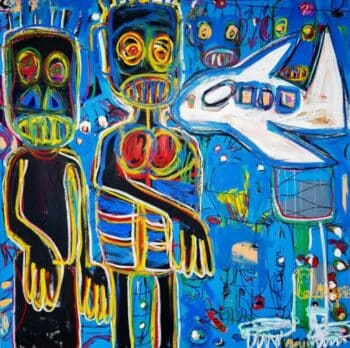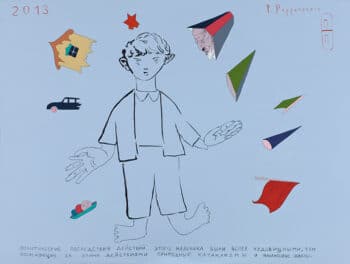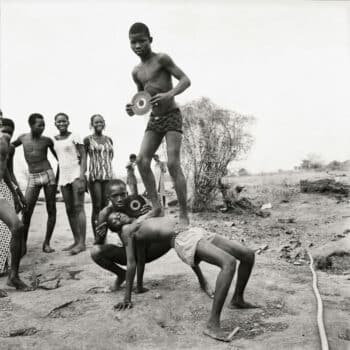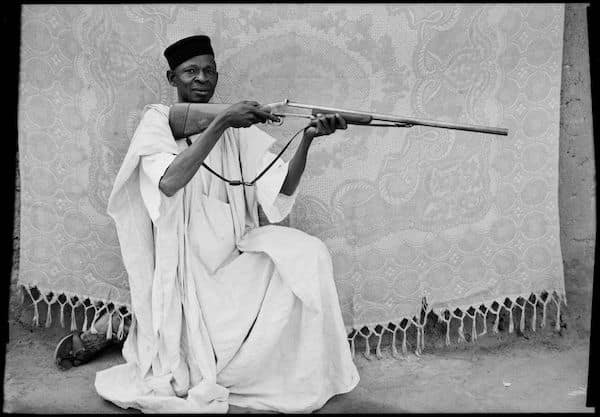Dear friends,
Greetings from the desk of Tricontinental: Institute for Social Research.
On 21 November 2022, Mali’s interim prime minister, Colonel Abdoulaye Maïga, issued a statement on social media announcing the government’s decision ‘to ban, with immediate effect, all activities carried out by [French] NGOs operating in Mali’. This announcement came a few days after the French government cut Official Development Aid (ODA) to Mali, alleging that Mali’s government is ‘allied to Wagner’s Russian mercenaries’ (referring to the Russian private military company, the Wagner Group.) Colonel Maïga called the French claims ‘fanciful allegations’ and a ‘subterfuge intended to deceive and manipulate national and international public opinion for the purpose of destabilising and isolating Mali’.

Aboudia (Côte d’Ivoire), L’Aventurier II (‘The Adventurer II’), 2018.
This is the latest expression of a new mood that has gripped the areas of northern Africa where France once wielded colonial rule. The debates in these countries—from Algeria to Burkina Faso—have brought into question France’s current military intervention in the region (a cycle that began with Côte d’Ivoire in 2002) as well as its continued economic stranglehold of fourteen countries in West and Central Africa through a set of monetary mechanisms (including the use of the CFA franc as their currency, which had been under the control of the French Treasury until December 2019). In recent years, Burkina Faso and Mali—both governed by militaries—have ejected French troops from their territories, while the eight countries of the West African Economic and Monetary Union (UEMOA) and the six countries of the Economic and Monetary Community of Central Africa (CEMAC) have made efforts to slowly unshackle their economies from French control. For example, in 2019, UEMOA reached an agreement with France to end the requirement that forced West African countries to keep half of their foreign exchange reserves in the French Treasury and to remove the French representative from the economic union’s board as part of broader plans to replace the CFA franc with a new regional currency named the eco.
French armed forces continue to have a strong presence in northern Africa, having only partially withdrawn from the Sahel region while maintaining close military and diplomatic links in countries such as Niger. ‘There is no uranium in France’, Jean-Luc Mélenchon, the leader of the democratic socialist party La France Insoumise, told me last year; ‘we import it mainly from Niger and Kazakhstan’. One in three lightbulbs in France is lit by uranium from Niger, which is why French troops garrison the country’s uranium-rich town of Arlit. Does the French retreat hint towards the end of its neocolonial military interventions and structures of accumulation in the region? The reality of the situation is far more complex. These partial withdrawals are taking place in the wider context of strains in the transatlantic alliance between Europe and North America, a dynamic that requires careful assessment.

Priya Ramrakha (Kenya), Soldiers in Training, 1967.
In October, I asked Abdallah El Harif of the Workers’ Democratic Way Party in Morocco about growing tensions between France and the Moroccan monarchy. This past summer, ten countries participated in U.S. Africa Command’s African Lion 2022 military exercise, which was hosted partly in Morocco. This massive military exercise and other such manoeuvres have sidelined France, which has openly indicated its annoyance with this dynamic. Morocco, El Harif told me, ‘has enormously developed its military relations with the United States’.
While French troops are being evicted from the region, U.S. and British troops seem to be taking their place. In 2017, five West African countries created the Accra Initiative to fight the expansion of the Islamist threat from the Sahel region; two years later, in 2019, the initiative’s anchor, Ghana, opened a U.S. military base in its international airport called the West Africa Logistics Network. ‘Hundreds of U.S. soldiers have been seen arriving and leaving’, Kwesi Pratt, Jr., a leader of the Socialist Movement of Ghana told me. ‘It is suspected that they may be involved in some operational activities in other West African countries and generally across the Sahel’. A controversy is currently unfolding in Ghana over Britain’s participation in the Accra Initiative, announced in the British parliament in November, and the deployment of British troops in the country and region. As we indicated in dossier no. 42 (July 2021), Defending Our Sovereignty: U.S. Military Bases in Africa and the Future of African Unity, although the chairs are being shuffled between France, the United Kingdom, and the United States, the militarisation of Africa continues.

Leonce Raphael Agbodjélou (Benin), Egungun Masquerade XII, 2015.
Over the course of the past few years, the French weapons industry has received some decisive blows. In 2021, the United Kingdom and the United States arm-twisted Australia to break a 2016 contract to buy twelve diesel-powered submarines from France’s Naval Group; instead, under a new deal with the U.S. and UK known as AUKUS, Australia would buy nuclear submarines from Electric Boat (US) and BAE Systems (UK). Meanwhile, as a consequence of greater German and U.S. collaboration over military provision for the Ukrainian army during the past eight months, Germany has shifted its own military purchases from European to U.S. arms manufacturers. For instance, in March, Germany announced that it would phase out the European-produced Tornado fighter jets in favour of U.S.-produced F-35 fighters. On top of this, as European sanctions on Russia increase, France has become increasingly distanced from the Russian market, to which it has continued to sell sophisticated military equipment despite various restrictions that have been enacted since 2014. The three largest markets for French arms sales—India, Qatar, and Egypt—have also signalled that they might switch to U.S. and Russian suppliers (the two leading arms exporters in the world).
France’s old Gaullist foreign policy tradition and a realist perspective of the connections between Europe and Russia drove French President Emmanuel Macron to attempt to facilitate a rapprochement between the Western warrior states and Russia over the past eight years through the Normandy Format. In his 2016 book Révolution, Macron wrote that ‘pushing Russia away from Europe is a profound strategic error’. This inclination towards an independent French foreign policy is now gone, whittled away by the changed balance of forces during the war in Ukraine and broken to a great extent by U.S. pressure to isolate and ‘weaken’ Russia.
Over the past several months, France has used the growing anti-Russia sentiment in the West to argue that its losses in Africa are not due to its own neocolonial adventures but rather are caused by Russia’s ‘predatory project’ on the continent. Macron’s deflections are accompanied by a lack of clarity on the streets in cities across Europe, where the cost of living crisis has led to massive demonstrations whose slogans have not expressed a clear understanding of the causes of galloping inflation. There is no sign of an independent European approach to the war in Ukraine that could lighten the burden on the European population.

Pavel Pepperstein (Russia), Political Consequences of Actions, 2013.
In early 2021, U.S. President Joe Biden said, ‘America is back, the transatlantic alliance is back’. This pronouncement came two years after Macron said that the North Atlantic Treaty Organisation (NATO), the fulcrum of this alliance, was suffering from ‘brain death’. Macron’s reply to Biden’s statement about the return of the United States was simple: ‘for how long?’. Macron’s state visit to Washington last December revealed the tension between the U.S. demand for European subordination and the necessity for European independence from U.S. national security requirements. The alternative—joining in the historical integration between Europe and Asia (including Russia and Turkey)—would provide major advantages to European society, but is instead sacrificed to the interests of the United States.
Meanwhile, over the past year, Mali’s defence minister, Colonel Sadio Camara, and its chief of the Air Force, General Alou Boï Diarra, have travelled to Russia several times, reportedly having been the ‘architects’ of the deal to bring several hundred mercenary fighters from Russia’s Wagner Group to Mali in December 2021. The Wagner Group soldiers in Mali have provided France with an excuse to ignore the wider anti-French sentiment in West Africa and the Sahel as well as to sidestep the fact that their military presence on the continent is being supplanted by Britain and the United States. The Russian presence on the African continent is minuscule (although growing since the October 2019 Russia-Africa summit at Sochi), but it provides Paris with a useful rationale for France’s diminished status on the continent and indeed in the world.

Malick Sidibé (Mali), Pique-nique à la Chaussée (‘Picnic on the Roadway’), 1972.
This is not the first time that Mali has pushed aside France to develop an independent national project. In 1960, Mali won its independence, and President Modibo Keïta led the country in its pursuit to establish sovereignty and contribute to the development of a pan-Africanist politics for the continent. In 1968, General Moussa Traoré left the barracks and overthrew the socialist government of Keïta. The overthrow of Keïta was not singular; the coup in Mali was part of a string of military coups on the continent, from Burundi (against Louis Rwagasore in 1961) and the Democratic Republic of Congo (against Patrice Lumumba in 1961) to Togo (against Sylvanus Olympio in 1963) and Ghana (against Kwame Nkrumah in 1966).
Reflecting on the coup of 1968, Keïta’s minister of communications, Mamadou el-Béchir Gologo, said that Traoré was ‘nothing but a tool in the service of France and other nations who wanted to rid Africa of its sons deemed to be rebellious’. Although Mali has been forced to pay the price for its rebelliousness since Keïta’s socialist experiments, its people have continued to resist. ‘Courage and conviction forbid retreat, no matter what happens’, Gologo wrote in My Heart Is a Volcano (1961). ‘To live is an adventure that one must assume without hesitation’.
Warmly,
Vijay

